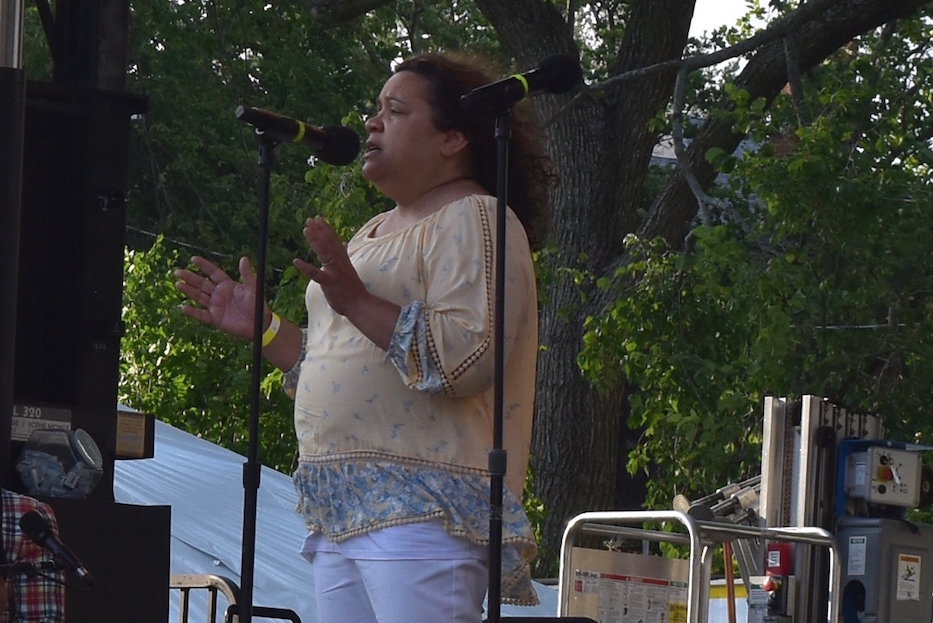
Downtown | International Festival of Arts & Ideas | Storytelling | Arts & Culture | COVID-19
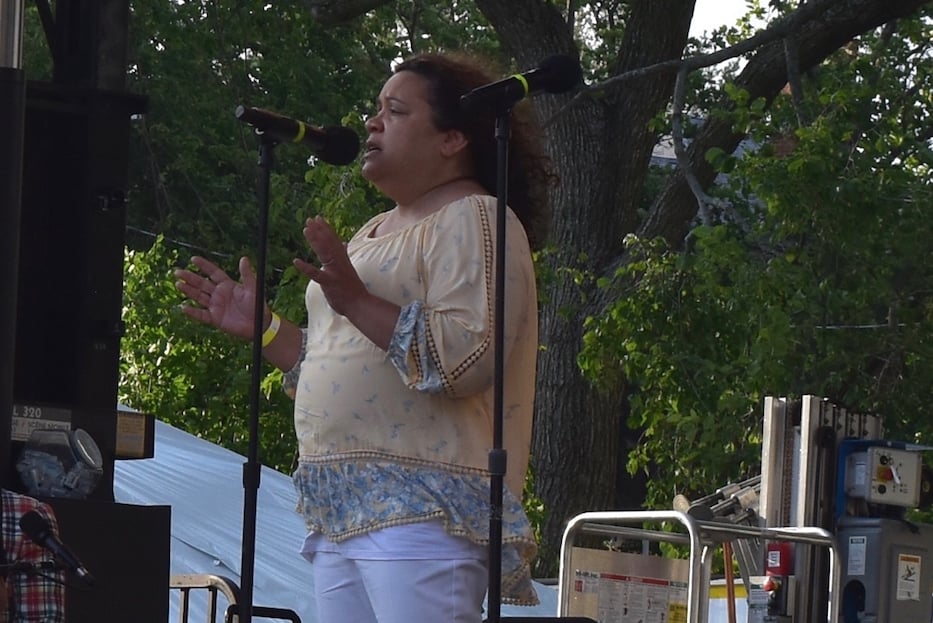
Cynthia Rojas. Leah Andelsmith Photos.
Joan Crawford and fur. A unicorn doula. Leopard-print undies. A spoon of power. A glimmer of hope.
Seven storytellers shared stories about those unlikely items Saturday, during a Story Slam presented by the International Festival of Arts & Ideas. The evening also featured New Haven musician Adam Matlock, performing songs from his recent album Thawing. Because the album was released during the pandemic, Matlock has only recently been able to play from it live. About 100 people gathered to listen in pairs and family groups on the multi-colored mats laid out for social distancing across the New Haven Green.
In this slam, the storytellers—mostly Connecticut-based—had five minutes each to tell a story that would move the audience’s hearts and earn their appreciation.
Cynthia Rojas recounted the anxious September night in 2017 when her phone rang with a call from her sister Betsy. Rojas remembered thinking, “I know it’s not good because her timing never is.”
She was right; their grandparents in Puerto Rico were unaccounted for after Hurricane María swept through the island.
“My Grandma, she is amazing,” Rojas said, her face scrunching as she emphasized the word. She held her hands close to her heart as she continued, “She loved me more than anyone on this earth. She told me I am perfect just the way I am.”

Betsy kept a glimmer of hope alive for the whole family, Rojas said, showing with her fingers just how small that hope became as the days ticked by with no word. They were able to connect with a famous pilot who agreed to search for their missing elders, but the mission was too risky and complicated, and the pilot returned without results, putting the sisters back at square one.
Rojas’ voice was heavy and slow as she recalled how tired Betsy became during the search, and her eyes lit up when she described the moment Betsy finally saw their grandparents safe and sound again.
In a quiet conversation on the Green afterwards, she explained how she structures her stories in terms of scenes, like a movie. That approach was effective for one audience member, who came up to Rojas to tell her how much she enjoyed the performance, saying, “You were so animated. You transported me. I was there.”
The emotions behind this story, a new one for Rojas, run deep. If she had told this story four years ago, she might not have been able to make it through without crying, she said. The story needed time to cure.
At first, “I didn’t know what the story was about,” she said. Was it about her grandparents? The famous pilot? After sitting with it for a while, she understood it was about Betsy. “Everyone eventually gave up, but Betsy never did,” she said. It’s a message Rojas intentionally wanted to spread right now: “You don’t give up on people, on life, on hope.”
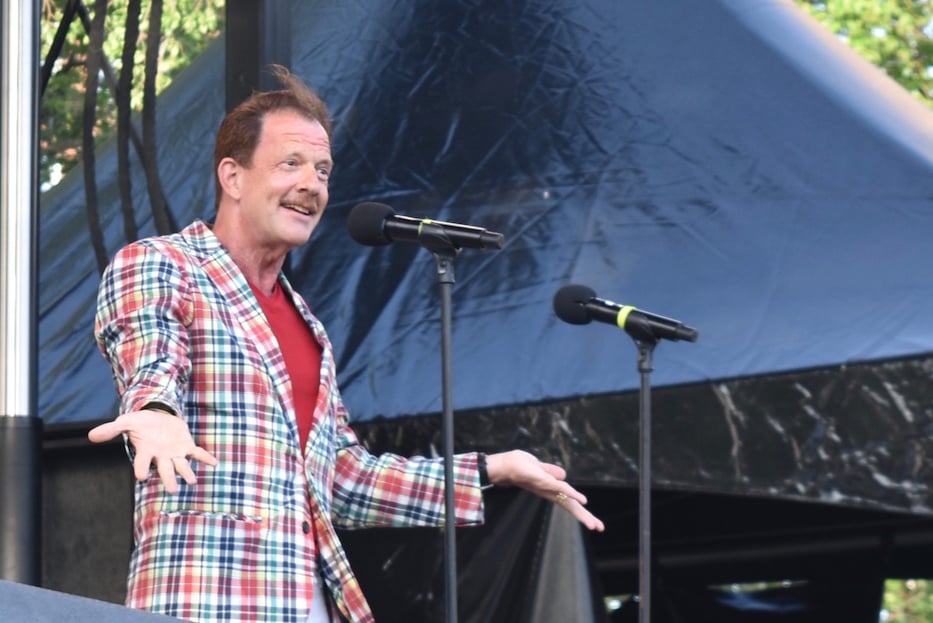
Jamie Brickhouse: “I have always loved old movies and fur.”
That was a theme echoed by many of the storytellers, a group that seemed to have a camaraderie with each other, even as they vied for the audience’s approval.
“I have always loved old movies and fur,” began Jamie Brickhouse. His journey stretched from coat checking at his parents’ parties, wishing boys could wear fur too, to moving to New York and buying his own fur coat. He lost that coat in a bar the first night he wore it, but bought another fur, previously owned by Joan Crawford, at an auction years later.
Of all the things he lost while struggling with alcoholism, he said, “I still couldn’t get over losing that coat.”
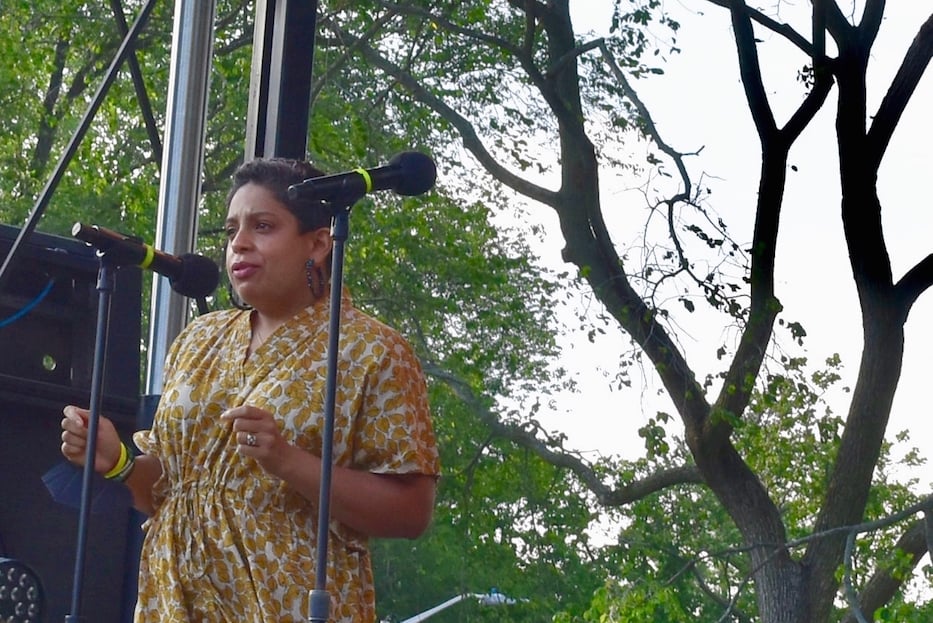
Jezrie Marcano-Courtney.
Jezrie Marcano-Courtney told of a tense and threatening encounter with police, her tone urgent and empowered as she recalled standing up for herself—first with the officer, then with the storytelling group she thought would support her. In the end, her best advocate was a Black teenager who happened to be waiting for the bus when the incident unfolded.
“His dark skin innately makes him a danger, yet he provides comfort,” she said.
Ron Apter captured the awkwardness he felt walking into his high school reunion, not knowing how to “condense 40 years into a 40-second sound bite.” What he realized is that he didn’t really attend the reunion to see his classmates, but instead to connect with his own past. “It’s me I’ve come to see,” he said. “My gawky, 18 year old self.”
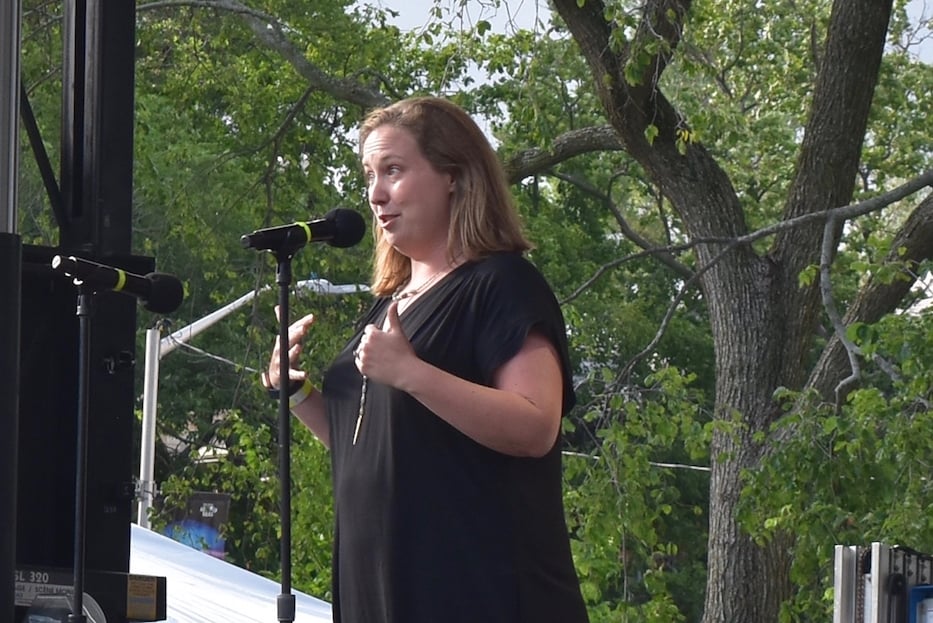
Jeni Bonaldo.
Jeni Bonaldo’s voice was even and matter-of-fact, her honesty endearing as she told an absurd but relatable tale about a typical evening routine at home. At the center of the story was her youngest daughter, who could “give a master class in bedtime nonsense” with her elaborate nightly game of pretending to be a pregnant unicorn.
Bonaldo found herself asking, “How did I get here?” but said she plays her role as a unicorn doula with gusto because these moments are fleeting. One day her daughter will transform again, not into a unicorn, but into a self-sufficient young adult.
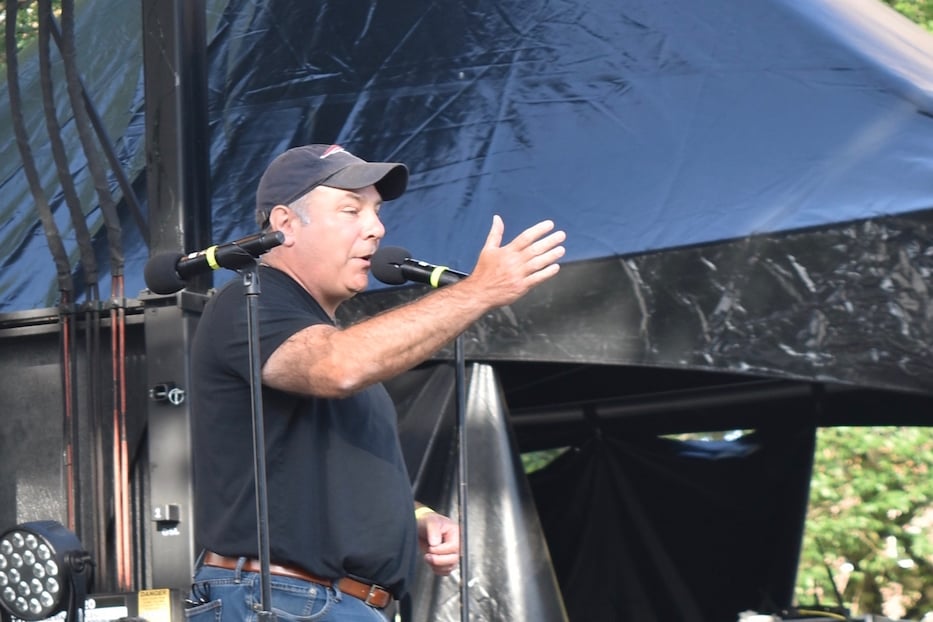
Matthew Dicks: Not just an abandoned spoon.
Teacher Matthew Dicks explained that it was just an abandoned spoon, found in a leaf pile on the recess field by Jamie, a fifth grader in his class. But it became a spoon of power when that student lent it to another who needed support.
Drawing laughs from the crowd as he rollicked at a rapid pace through the antics of life in a fifth grade classroom, Dicks’ voice became soft and slow as he described how the spoon of power became an emotional fixture in his class. His hands told the story too: reaching out for the spoon as he chased Jamie for it that recess period 14 years ago, gently placing the spoon on its chain around a student’s neck to give them confidence.
The pandemic found Dicks teaching in the classroom and online, as he and many of his students went in and out of quarantine.
This past year, “the hardest and best of my life,” his class needed that spoon almost every single day.
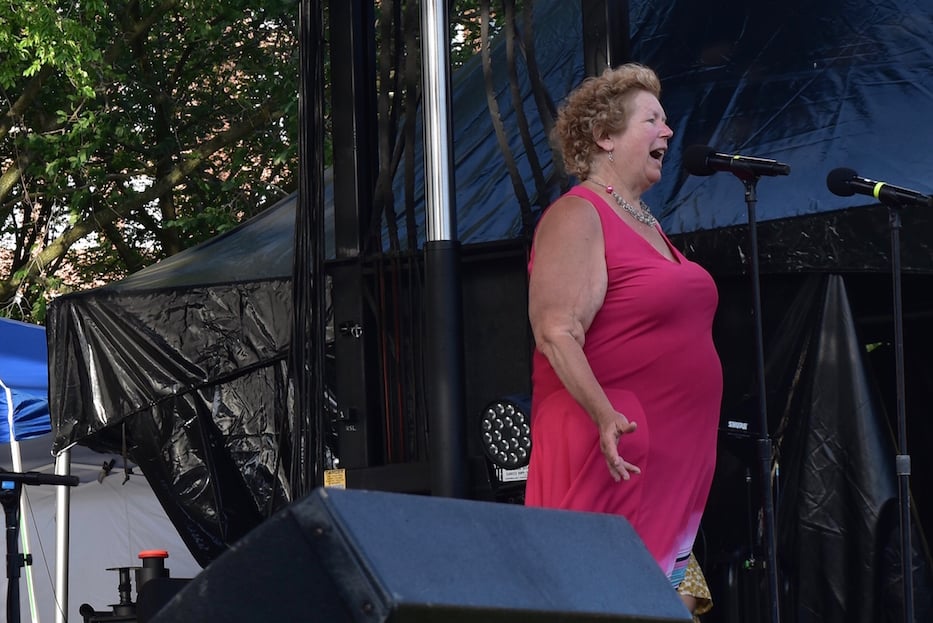
Nina Lesiga.
Nina Lesiga said she was riding on the back of a motor scooter on vacation in Vietnam when she realized “I’d been playing it safe.” Always worried about her plus size, Lesiga decided to boost her confidence by participating in the New York City No Pants Subway Ride. She first “went to my panty drawer to assess its contents” then headed to the store for a new pair of leopard print undies.
Lesiga’s storytelling was scandalous and confidential, as if she were confiding in a hundred best friends she just met on the New Haven Green that night. The audience sat poised with smiles as they hung on her words, knowing another hilarious moment was just around the corner as Lesiga chronicled the wild subway ride where “everyone belongs.”
It was a close call, but the crowd’s applause and raised hands pointed to Dicks as the night’s winner, though competition didn’t seem to be the main focus of the evening. To Lesiga, the story slam “felt like a reunion” after a long break from in-person storytelling events during the pandemic. To the gathered crowd, held rapt by the performers in a somewhat magical silence for most of the evening, it seemed to be about the power of story.
That was definitely true for audience member Denise Page, who is active in the storytelling community in Connecticut. She came to the slam to support her peers, but ended up being most captivated by the stories that were “fresh to me.”
What she loves about storytelling is that, through a story, you can understand someone else’s culture more deeply and immediately than with any other art form, even in just five minutes. Storytelling is not about what happened in the past to other people, she said.
“It’s saying, ‘This is what happened to me. This is my story.’”

